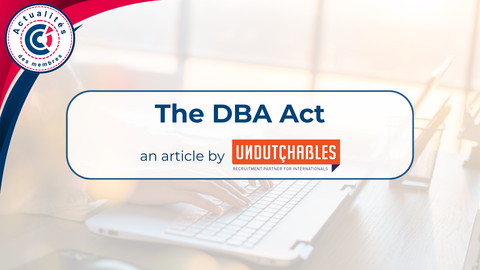Actus des entreprises
The DBA Act: What to keep in mind

The DBA Act is a hot topic. For those working with freelancers, understanding its details is essential.
Understanding the DBA Act for Freelancers and Companies in the Netherlands
The DBA Act (Wet Deregulering Beoordeling Arbeidsrelaties) is a crucial piece of legislation in the Netherlands that affects the relationship between freelancers (self-employed individuals) and the companies that hire them. It was introduced to clarify when freelancers should be considered independent contractors and when they should be classified as employees. This distinction is important because it impacts tax liabilities and compliance for both freelancers and the companies they work with. Below, we’ll explain the DBA Act, how it impacts both parties, and what companies and freelancers need to be aware of to stay compliant.
What is the DBA Act?
The DBA Act came into force in 2016, replacing the earlier VAR (Verklaring Arbeidsrelatie) system. The objective of the act is to provide clearer guidelines on the relationship between freelancers and their clients, particularly with regard to false self-employment (schijnzelfstandigheid) —where freelancers are, in fact, acting as employees but without receiving the legal protections employees are entitled to.
Under the DBA Act, companies and freelancers must ensure that their working relationship does not resemble an employer-employee relationship. If the Dutch Tax Authority (Belastingdienst) determines that a freelancer is effectively an employee, the company could be responsible for paying additional taxes and social security contributions.
Key Criteria to Avoid Employee Misclassification
To determine whether someone is genuinely a freelancer, the Dutch Tax Authority look at many factors. You can complete this this scan (in Dutch) to get a better idea of whether your situation and the project you are working on can properly be classified as a freelance assignment.
While there is a long list of requirements when it comes to registering with the Chamber of Commerce and Tax Authority as a freelancer, here are some of the key elements the Tax Authority uses to classify a freelance contract:
1. Authority Relationship: The freelancer should have control over how they complete their work without being directed by the client. Unlike employees, who are subject to the direct supervision and control of their employer, freelancers should have a high degree of autonomy in how they execute tasks. If the client has significant authority over the freelancer's work (i.e. setting hours, supervising workflow, or providing direct instructions), it suggests an employment relationship and does not qualify as a freelance construction.
2. Personal Obligation to Perform the Work: This has to do with whether the freelancer must personally carry out the work or if they can delegate tasks to others. A self-employed individual should have the freedom to send a substitute to complete the work in their stead when desired, while employees are usually obligated to perform tasks themselves.
3. Compensation for Work: How payment is structured, and the agreed upon compensation for the tasks, can make a difference in whether a worker is considered an employee or a freelancer. The hourly rate for a freelancer should be significantly higher than the industry standard for an individual employed by a company. Self-employed individuals also typically charge on a project basis or per deliverable, whereas employees receive a regular salary, that is periodically paid out on a set schedule. Additionally, freelancers should not receive a benefits package like employees do, such as holiday pay or sick leave. These insurances and investments are arranged by the freelancer themselves.
If these criteria suggest that the freelancer is functioning as an employee, the Tax Authority may decide to reclassify the freelancer’s status, which can have significant consequences for both the freelancer and the hiring company.
Why the DBA Act Matters for Freelancers
As a freelancer in the Netherlands, you are responsible for ensuring that your working arrangement with a client complies with the DBA Act. If the Tax Authority reclassifies you as an employee, it could affect your tax status and potentially lead to higher personal tax obligations. You may also lose some of the freedoms typically associated with freelance work, such as autonomy over how you complete your projects.
To avoid these issues, freelancers should:
- Use clear contracts: Ensure that contracts outline the nature of the freelance relationship and specify that you maintain control over how and when the work is completed.
- Diversify clients: Working for multiple clients can help demonstrate that you are truly self-employed rather than dependent on one company.
- Maintain autonomy: Make sure your working arrangement shows you have flexibility in determining your workflow, work location, and how the work is done.